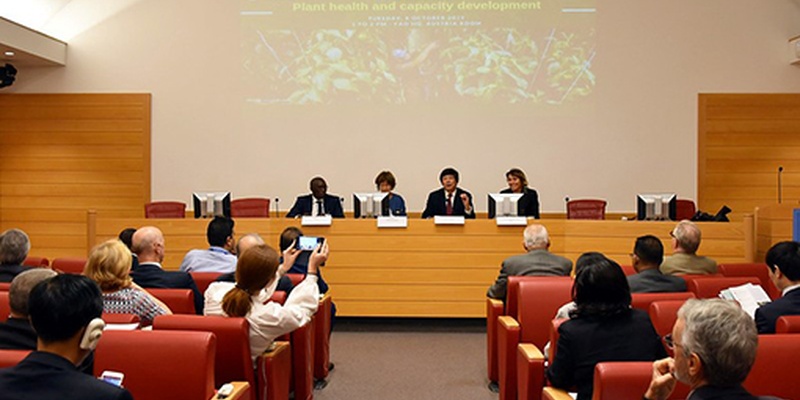The IPPC Seminar on Plant Health and Capacity Development: an excellent opportunity to strengthen collaboration with the STDF
Posted on Wed, 16 Oct 2019, 12:47

A swarm of desert locusts have moved into Kenya from Somalia and Ethiopia, destroying farmlands FAO Sven Torfinn
8 October 2019, Rome – The IPPC Secretariat’s tenth seminar, focusing on the 2019 annual theme of “Plant Health and Capacity Development”, took place at FAO headquarters on 8 October 2019. The Seminar was chaired by Mr Jingyuan Xia, IPPC Secretary.
Phytosanitary Capacity Evaluation (PCE) in Comoros
Ms Sarah Brunel, IPPC Implementation Facilitation Officer, presented how the Phytosanitary Capacity Evaluation (PCE) process helps countries identify both strengths and weaknesses in their phytosanitary systems. This allows them to develop, with consensus of all stakeholders, a strategy and action plan to address their weaknesses and build on the identified strengths.
She gave the example of Comoros where a PCE was conducted in 2017 with support from the Standard and Trade Development Facility (STDF). The process resulted in new phytosanitary legislation being passed the same year; and the government allotting additional financial resources to the NPPO. A National Phytosanitary Capacity Development Strategy was also developed which helped attract further investments.
Ms Brunel invited countries interested in conducting a PCE to approach FAO National Offices. They should also submit a request to the IPPC Secretariat to grant them access to the PCE platform; and a list of recommended PCE facilitators.
Prioritizing SPS Investments for Market Access
Ms Marlynne Hopper, Deputy Head of the STDF Secretariat, then presented the STDF’s framework for Prioritizing SPS Investments for Market Access (P-IMA). P-IMA is an evidence-based approach for improving Sanitary and Phytosanitary (SPS) planning, decision-making and resource allocation. P-IMA uses multi-criteria decision analysis to set SPS investment priorities. It uses available information and data including the results from a PCE. Ms Hopper also highlighted opportunities for linking the use of the PCE and P-IMA.
Case study from Madagascar
Finally, Mr Babacar Samb, SPS specialist and Director of Bioscope SRL, showed how Madagascar used STDF’s P-IMA framework to prioritise key phytosanitary investments identified during the PCE for improving market access Madagascar’s National Phytosanitary Capacity Development Strategic Strategy (2018-2028) resulted from a PCE that had been conducted. Several studies had also identified weaknesses in national capacity to comply with international SPS requirements.
However, there were not enough resources available to cover the investment needed to address these weaknesses. A P-IMA study to prioritize investments to improve market access for exports was thus carried out. The study was supported by the STDF and requested by the Minister of Agriculture of Madagascar.
Proposals for improving the PCE and P-IMA
The audience provided feedback on the application of P-IMA in Tajikistan. Several countries also expressed interest in applying both tools. Proposals to improve the tools included: - encouraging countries implementing a PCE to also conduct a P-IMA; - improving the PCE tool by including a more detailed cost analysis for activities proposed in the National Phytosanitary Capacity Development Strategy; - incorporating value chain considerations in the PCE tool.
Presentations from the seminar are available at: https://www.ippc.int/en/themes/capacity-development/
Photos from the IPPC Seminar are available at https://www.flickr.com/photos/182442121@N04/albums/72157711259121221

